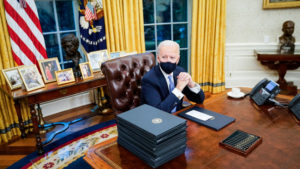
Javier Castillo Maradiaga’s fate hangs in balance, caught between deportation and a judge’s decision to block Biden’s deportation ban.
The former DACA recipient’s deportation to Honduras early this week had been stopped by President Biden’s 100- day suspension on most deportations. Maradiaga was transferred from an Immigration and Customs Enforcement (ICE) facility in Los Angeles to New York.
Federal JudgeDrew B. Tipton issued a temporary restraining order earlier this week, stopping Biden from enforcing the ban for 14 days. Judge Tipton of Southern Texas said the Biden administration failed to “provide any concrete, reasonable justification for 100-day pause on deportations”.
The order targets a memo by acting Secretary of the U.S. Department of Homeland Security, David Pekoske, which ordered ICE to pause most deportations and prioritize removals of people who are considered public safety or terrorism risks. A White House spokesperson said earlier this week, “We’re confident that as the case proceeds, it will be clear that this measure was wholly appropriate in ordering a temporary pause to allow the agency to carefully review its policies, procedures, and enforcement priorities – while allowing for a greater focus on threats to public safety and national security”.
An ICE spokesman, Marcus Johnson, was not able to confirm Maradiaga’s status. He did state that as of January 23 about 1.2 million people had final orders of removal and about 6,000 people with those orders are in ICE detention centers.
Maradiaga’s attorney, Rebecca Press, has filed emergency stays of removal with the board of Immigration Appeals and ICE as well as other motions to reopen his proceedings and request his release from ICE custody.
The family moved to the U.S. trying to escape gang violence in Honduras and his parents are under Temporary Protected Status (TPS). Dariela, Maradiaga’s sister, stated “As immigrants, we’re afraid, we don’t want to attract attention, and we tend to deal with these things in silence. Once we decided to go public, we had an elected official, Ritchie Torres, helping out, sending letters. … So, we’re trying to be vocal about what’s happening in our communities so there are no more Javiers”.

Recent Comments